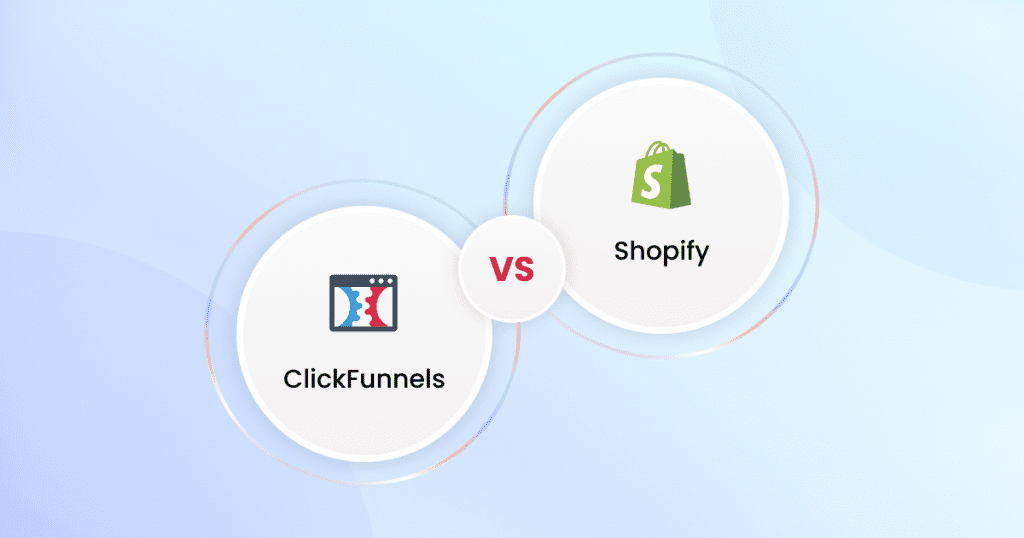Shopify and ClickFunnels are two humongous ecommerce names with very big customer bases. But often, many people need clarification about which is a better choice. Now, there cannot be a simple explanation for that.
You will have to understand prices, pros, cons, use cases, and more to understand what platform is suitable for whom. In short, personal needs play a big role in figuring out which of these two is more suitable for the business.
If you want a quick summary, click-funnels are designed for funnel-building. But we cannot say it can’t be used to sell your dropshipping products. However, that is not its strength either.
Its main job is to build professional-looking and quick sales funnels.
Besides that, it is possible to SEO optimize a Shopify store and rank it in Google’s organic search results, which clearly means more free traffic hitting your store. To summarize, you can get a Shopify store to build your e-commerce store, while click funnels can be used to create sales funnels.
Both of these offer a 14-day free trial.
Key Takeaway :
ClickFunnels and Shopify are both popular e-commerce platforms, each with its own strengths.
ClickFunnels is designed for creating sales funnels and is a great tool for maximizing lead capture and generating sales. On the other hand, Shopify is a comprehensive e-commerce platform with extensive capabilities, making it suitable for building online stores and optimizing them for SEO.
The choice between the two depends on individual business needs and preferences. ClickFunnels may be more suitable for businesses focused on creating sales funnels, while Shopify is a better fit for those looking to build and optimize their online stores for various products and services.
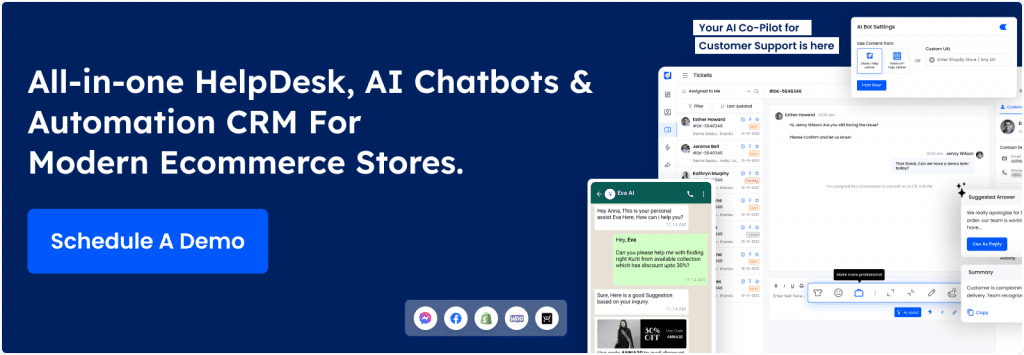
ClickFunnels vs Shopify: Overview
Online selling enthusiasts and e-commerce platform owners know about ClickFunnels and Shopify, or at least have heard the names of these two awesome platforms. Both of these offer different features and benefits for various requirements.
ClickFunnels, as mentioned before, is mainly focused on building decent sales funnels and, up to some extent, conversion optimization. It offers you a streamlined platform for elevating conversion rates from your landing pages to product check-out processes.
Its main aim is maximizing lead capturing and generating sales. In comparison to that, Shopify is something that has very comprehensive e-commerce capabilities. It has a great array of features, which can include payment gateways, inventory management, and a humongous app ecosystem. You can see many multi million dollar businesses ( they do need Shopify Plus subscription) running tremendously successful, highlighting the excellence of this wonderful platform.
This tool is like a diamond for online merchants of various sizes, and it also highly helps in terms of scalability. there are many integrations possible (check this guide for a decent business scaling example). Now it is the time to explore the ClickFunnels versus Shopify comparison to help you make more consolidated but logical decisions on which one is right for your sales needs.
ClickFunnels
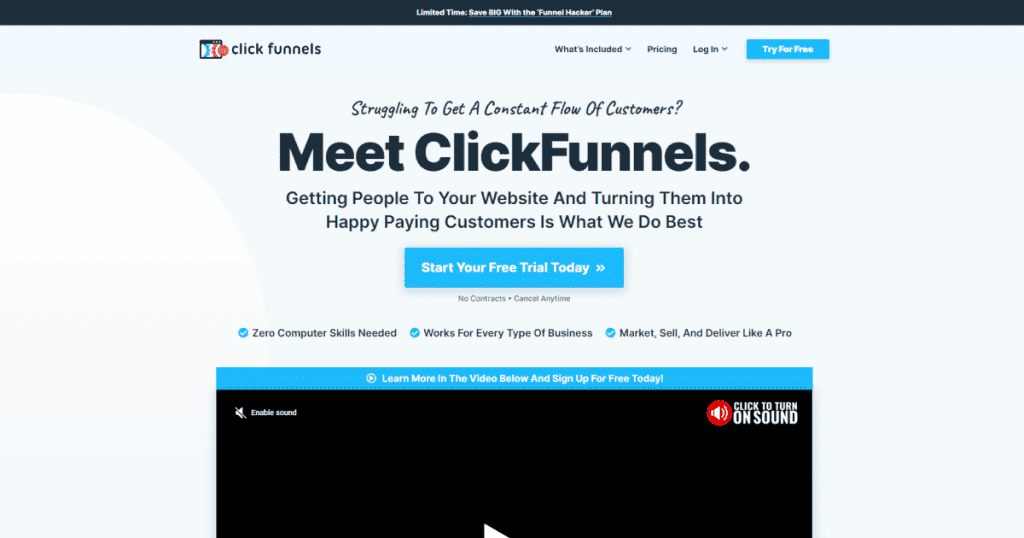
All those involved in online selling businesses know one thing very well: selling products or services online is never easy. You need to generate leads and push your leads into sales funnels, and that’s how you get conversion rates.
ClickFunnels is something that helps you in the same way. Its key functionalities and features include funnel creation and customization. You can also use it to design your landing pages and integrate with email marketing tools.
Sales and order management has become very easy and is also a decent tool for helping affiliate marketers. ClickFunnels is a user-friendly interface. It is a simple drag-and-drop editor that allows users to customize sales funnels, no matter if they don’t know a thing about coding.
You can call ClickFunnels a one-stop destination offering built-in email marketing and affiliate management tools, and all of this saves a lot of time. However, we cannot deny that ClickFunnels has a few limitations when it comes to e-commerce features in contrast to dedicated platforms such as Shopify.
You can expect it to offer basic e-commerce functionalities, but Shopify is something that excels in offering a much broader range of features especially tailored for online merchants. Furthermore, the pricing of ClickFunnels is higher than on various platforms, so those with a small pocket don’t use ClickFunnels for their ecommerce store.
Besides that, if you plan to create some complex funnels, it may require you to climb a steep learning curve. Otherwise, you won’t be able to use the capabilities of these platforms to the level.

Shopify

Oh, come on, now we all ecommerce enthusiasts know about Shopify; after all, it’s a leading e-commerce platform that helps businesses of various sizes conveniently set up and customize their loved online stores. You can expect a lot of features and functionalities, which is the core reason why it is so successful among businesses of various segments.
It is an extensive app store that adds payment gateway integrations, order and inventory, SEO, marketing tools, management tools, banners, and whatnot.
One of the important benefits associated with using Shopify is its reliable e-commerce tools and flexibility. It is easy because Shopify provides multiple themes and designs to make your stores attractive and exclusive. In addition, Shopify’s app market has many applications and extensions, making it possible for you to tailor-make or scale the store per your requirements.
However, one concern with using Shopify is that you may have to shed extra application costs. Now, these transaction fees included can also vary according to the apps. Also, it may take time to understand things when you look upon customizing your Shopify store, especially when you have not done it before.
And if you don’t have much technical expertise, then it can be tough for you. You may have to watch a few video tutorials to complete things. Also, Shopify offers some sales funnel capabilities for your online business, but they are less than click funnels.
Importance of Desku for ClickFunnels and Shopify users
Desku for ClickFunnels and Shopify users should not be viewed as an option but rather a strategy for success in the e-commerce arena. Desku is the one that boosts your e-store functions and takes your interaction with clients to the next level.
First and foremost, the integration of Desku on ClickFunnels offers an unmatched convenience to the former’s user base. This platform simply works in tandem with ClickFunnels to ensure proper synchronization of customer data, orders, and other interactions.
While this integration does not only ensure smooth operation, but also weaves an orchestra of effectiveness where your teams operate in unison, masterfully maneuvering the complexity of customer relationship management.
Secondly, Desku is a complete solution that boosts Shopify user’s store performance. The live chat offered by Desku is the interface through which customers interact, thus building trust, enabling instant purchase decisions and increasing sales. The Chatbot-Deskubots feature equipped Shopify users with a no-code chatbot builder that made it easy to craft smart, individualized communication.
In addition, the Knowledge Base makes it possible to disseminate information about products as well as Frequently Asked Questions, which leads to a decreased number of service inquiries and a better-informed clientele. Unified and responsive in an online presence, with seamless integrations, including social media management through Social Inbox.
Desku’s Accurate Reports & Analytics gives ClickFunnels and Shopify customers information about customers’ actions, which helps make data-based decisions. Similarly, other improvements in automation, as well as macros, make operations more efficient through the automatic performance of repeated actions and pre-programmed answers.
Therefore, in retrospect, Desku is more than just a tool. It is a reaffirming partner for both ClickFunnels and Shopify users. It changes how a client experiences a business, operationalizes the firm for better efficiency, and finally leads to more purchases.

Shopify vs ClickFunnels: Features
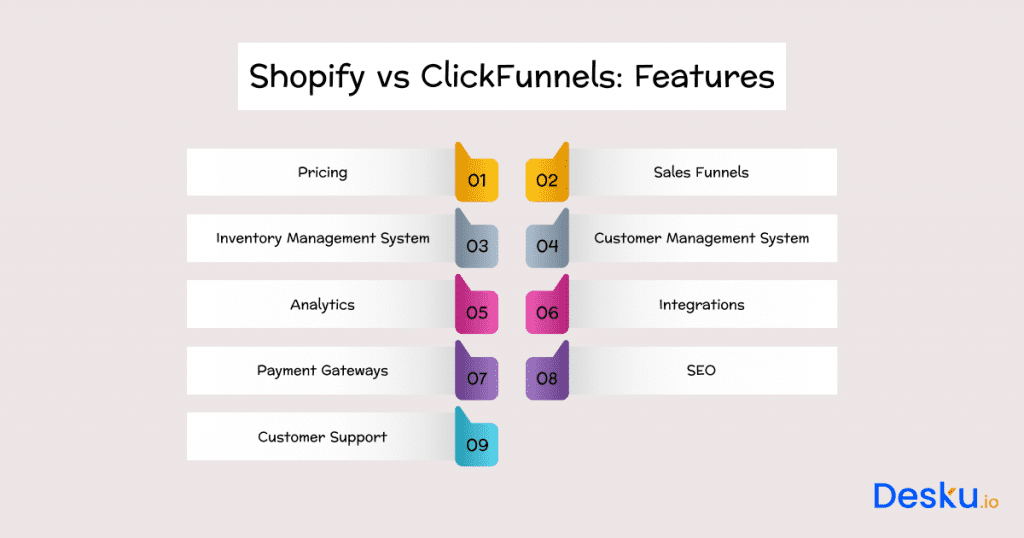
Pricing
You’ve got 3 basic plans with the Shopify ecommerce platform, costing you $29, $79 and $299 monthly. High-volume merchants and enterprises have Shopify Plus with different prices. Besides the monthly expense, Shopify also charges its users a transaction fee for credit card usage. It decreases or increases as per plans.
On the other hand, ClickFunnels also offers standard pricing plans. However, many folks won’t be happy with their starting point. The basic plan costs you $97/month, in which you get 3 domains, 100 landing pages, and 20 sales funnels. The ClickFunnels Platinum plan costs you $297/month, in which you get 9 domains and unlimited landing pages and funnels.
Sales Funnels
Many of you will agree that a healthy sales funnel is the key to any business’s success. This proves to be 1005 true for e-commerce stores, with survival relying on how their site visitors convert into buyers.
Creating a strong stream for your online store income without a proper sales funnel doesn’t prove to be possible, especially considering today’s high-competition e-commerce landscape. ClickFunnels is a superb software expert in delivering funnels that prove to help sell various kinds of products.
You’ve got funnels for digital products, physical products, e-books, courses, subscriptions, memberships, and whatnot. Besides that, you get some amazing templates for sales pages, thank-you pages, and opt-in pages.
We really loved the templates for checkout pages; you just need to add them to your copy and image, and in no time, your sales funnel is going to be ready to rock. Shopify helps users in terms of ease of tool usage for designing a perfect e-commerce store.
But let us tell you, the process is never going to be as simple as what you get with the ClickFunnels. However, it is possible to integrate Shopify with various software to help you convert your customers at a good percentage.
Inventory Management System
Inventory management proves to be a key to every single person running an online store. This is a place where Shopify proves to be the king of the market, and defeats click funnels as well.
If you are a Shopify user, it will be very easy for you to keep a strong track of current as well as new inventory. You just need to add a product, create various variants, and post some of the most attractive images.
Now, you assign the item numbers you have in your store. Shopify will be your friend to track how many things you have sold and, most importantly, give you warnings on what is going to be out of stock in the upcoming time.
On the other hand, ClickFunnels is not a store-building platform, which is why we cannot expect it to include inventory management in its features list.
Customer Management System
When you compare ClickFunnels and Shopify in terms of handling customer management, you will find that these platforms don’t differ from each other that much. You get a tremendous way for viewing in-depth information about your customers with ClickFunnels.
You can see where they come from, cherish their email address, and what they bought from your store. Besides that, segmenting your customers in various email marketing campaigns considering their positions, whatever they brought, and the amount of money they spent is entirely possible.
In comparison, Shopify helps monitor the buying habits of consumers who have purchased from your store. You can conveniently build subscription pages to help them repeat purchases and create highly targeted email marketing campaigns for the customers on the basis of their product purchases, money spent and country.
Analytics
The greatest advantage of using correct analytics is discovering your stronger and weaker points.
Analytics provide data for determining whether your marketing strategies are effective when it comes to enhancing and improving your online sales revenues. How do Shopify and ClickFunnels support you in understanding better how your product is interacting with your customers?
With Shopify’s analytics and reports, you can look at what your store has just been up to, get a glimpse of your clients, measure how fast your store is, and check on your exchanges. Each Shopify subscription plan affords different analytical and reporting options.
You may additionally choose to introduce third-party analytics solutions like Google Analytics in order to gain more perspectives and extend your market.
In addition, like in the case of Shopify, you can use third-party analytics such as Google Analytics, but unfortunately, ClickFunnels default features don’t include analytics.
Integrations
You can see both click funnels and Shopify calling themselves perfect all-in-one tools. But it is already understood that both of these serve pretty different purposes. It is almost impossible to cover every single base, especially considering the complexity the developers of these platforms have used.
This is the reason if you are searching to elevate your platform to a whole new level; you need to beef it up by integrating it with various powerful and impactful marketing tools that help you elevate your sales directly or indirectly.
Both Shopify and ClickFunnels offer simple integrations and several third-party tools that cover a vast array of things such as payment, email integration, accounting integrations, and whatnot.
Payment Gateways
We can say that payment gateways are probably the biggest difference between Shopify and ClickFunnels. Shopify has its own in-house payment processing platform, while in comparison, ClickFunnels depends upon third-party integrations.
Stripe, PayPal and various payment providers are integrated into ClickFunnels. However, it is worth considering that your funnel is going to operate with just one payment gateway at a time.
In case you desire to offer something more than that, you will have to build two funnels with exactly identical customer interactions and offer a button on your sales page that redirects your customers to their preferred payment gateway.
Talking about Shopify, you will be amazed to know that it integrates over 100 payment providers across the globe to allow your online store to accept your customer’s payments by their preferred methods.
SEO
We can say a lot of positive things about ClickFunnels. It’s undoubtedly a tremendous marketing tool that gives all companies a nice suite of resources to help them create and launch online sales funnels in no time.
However, the question arises: Are ClickFunnels good enough for SEO? Well, you need to understand that ClickFunnels was actually not created keeping SEO in mind. The main philosophy behind creating this particular tool was supporting online store owners in terms of paid and organic social media traffic instead of SEO.
So, in simple words, ClickFunnels is not that good for SEO. However, you can try out a few tricks to improve this. You need to keep in mind it is also pretty time-consuming, and there are certain limits.
On the other hand, Shopify is a clear winner in this competition when it comes to SEO. You will be able to see a lot of Shopify stores ranking on some very hard keywords in common highly advanced SEO features that can help your Shopify app store drive more traffic.
Customer Support
Determining whether Shopify or clickfunnels offers better customers is hard to tell.
The best customer service is associated with Shopify. The company ensures that each client has an availability to a customer adviser who works 24 hours per day, seven days a week throughout the year. Additionally, the clients can ask or raise some concerns through emails, chat, and phone calls and get answers or receive some resolutions within seconds.
Their customer service is also almost equivalent, providing a live chat option that was recently introduced in a bid to provide solutions to issues users may have encountered in their operations. ClickFunnels offers the same sort of support. It’s a clear tie between these giants. Also, you can opt for Desku’s helpdesk solution to automate the process of providing frequent customer support to the visitors.

ClickFunnels Pros and Cons
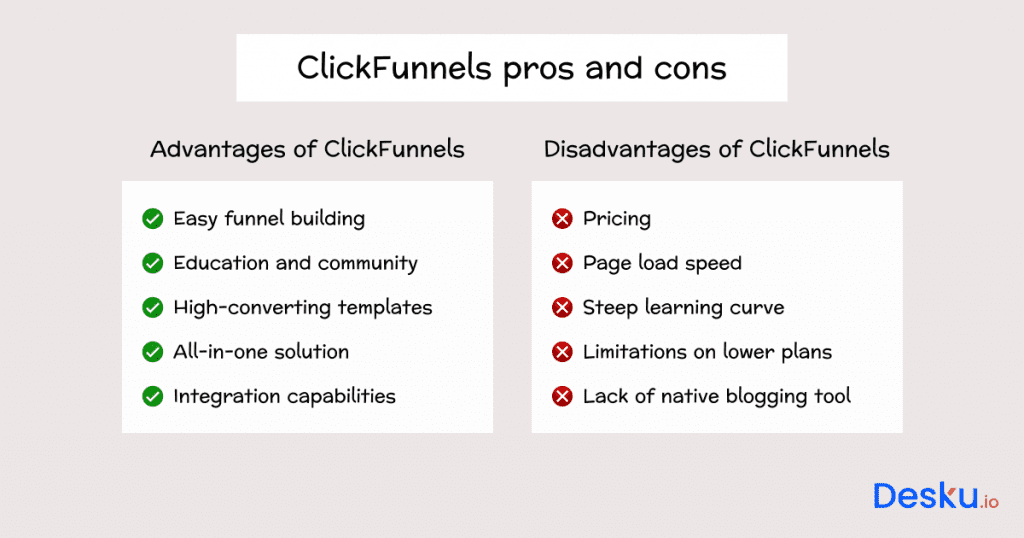
ClickFunnels pros
- Easy funnel building: You get a very user-friendly drag-and-drop editor, which is so straightforward that you will be able to find yourself a master even if you have no technical expertise whatsoever.
- Education and community: ClickFunnels, a robust community, is always happy and agile at offering extensive educational resources, courses, webinars, events and a lot more to help users maximize this platform’s usage.
- High-converting templates: You can call it a comprehensive tool for various online marketers and sellers. You enjoy a tremendous range of pre-designed funnel templates that are created by conversion specialists.
- All-in-one solution: ClickFunnels offers much more than just creating perfect landing pages for you. It offers special capabilities for affiliate management, email, autoresponders, and much more.
- Integration capabilities: You, as a user, can conveniently choose and customize any of these templates as per your requirements. It is in no way tough to integrate ClickFunnels with various third-party tools and services. Let it be email marketing platforms, payment gateways or CRMs.
ClickFunnels cons
- Pricing: Out of various negative factors, the most disturbing one proves to be the pricing. The monthly subscription, even the smallest one, is pretty costly, especially for new businesses and entrepreneurs who have just started out.
- Page load speed: We came across a few users who reported problems with the landing pages taking a pretty long loading time, and this is something that can highly affect conversion rates.
- Steep learning curve: Obviously, this platform offers several features, but honestly, the interface is somewhat overwhelming for many newcomers and takes time to understand.
- Limitations on lower plans: The basic plan obviously charges high, as explained, but still, it has many limitations. Let it be pages, visitors or funnels. And this proves to be a great hindrance to the growth of business.
- Lack of native blogging tool: A native blogging tool is missing in click funnels, which is again a big negative. So, if you are looking forward to integrating your content marketing tactics along with your sales funnel, click funnels are not for you.
Shopify Pros and Cons
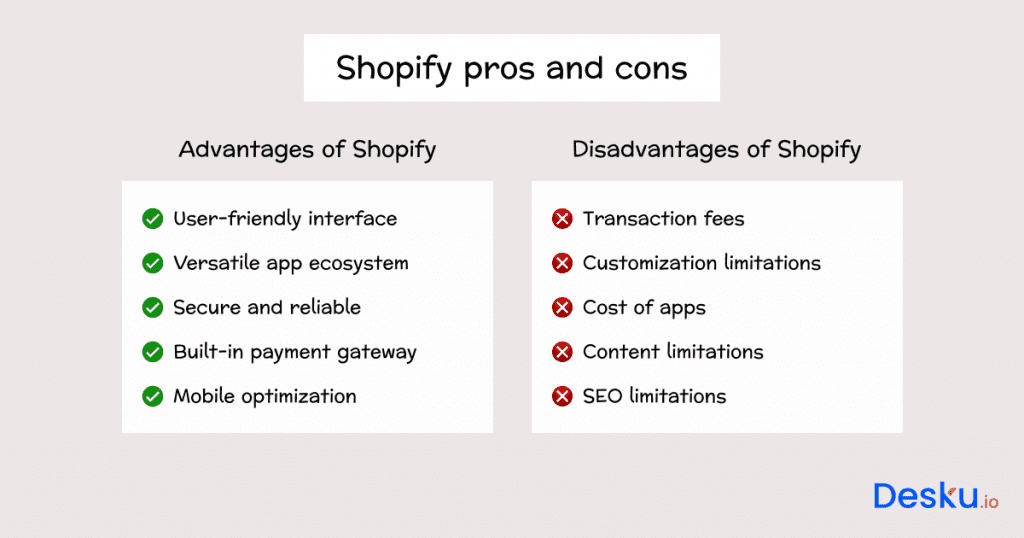
Shopify Pros
- User-friendly interface: You will hardly find a person complaining about the user interface of Shopify. This is the reason even non-technical experts find it very easy to manage their online store on Shopify.
- Versatile app ecosystem: You get a tremendous variety of apps that you can extend the functionality of your store, whether you talk about marketing, inventory, management or anything else.
- Secure and reliable: You get SSL certificates for your Shopify stores to ensure that the platform is always in touch with the most recent security patches, and this is something that gives store owners a great level of mental peace.
- Built-in payment gateway: You get a Shopify native payment solution, which we call Shopify payments, which is integrated directly into the store. This simplifies the transaction to a great level. Yes, a lot of third-party payment gateways can also be supported.
- Mobile optimization: All Shopify themes are perfectly mobile optimized. So online stores not only look but also function perfectly on various devices.
Shopify Cons
- Transaction fees: Shopify charges extra transaction fees for the shop owners who don’t choose to use Shopify payments.
- Customization limitations: Shopify is customizable, but you also face some limitations regarding how much you can modify your platform, especially if you have no knowledge about its liquid templating language.
- Cost of apps: Undoubtedly, the App Store is huge, but the bad news is that the majority of those apps require monthly fees. Now, when your store grows, it needs more apps, and this puts an extra pressure on your pocket.
- Content limitations: Shopify is an e-commerce platform that supports blogging, but you miss some of the advanced content management features that you get in various dedicated CMS platforms.
- SEO limitations: You get basic SEO features with Shopify, but you also face certain limitations, such as URL structure and various elements that will affect your business if you are highly dependent on organic search.

Conclusion
The decision to use either ClickFunnels or Shopify largely relies on your unique business needs and objectives. ClickFunnels could be appropriate if you emphasize the simple design of your sales funnels.
Shopify is likely the best choice for you if you need full e-commerce features, customization options, as well as your site to be scalable.
Therefore, you should give your time and research each of the platforms thoroughly before pulling out your credit card. Take some time to read about their case studies, sign up for their free trials, and check on some of their users’ reviews, which can be found easily online.
Through a thoughtful analysis of ClickFunnels and Shopify, you will be able to choose what is best for your budding e-commerce business. Also, Desku’s integration can increase both engagement and sales by providing frequent customer support.
